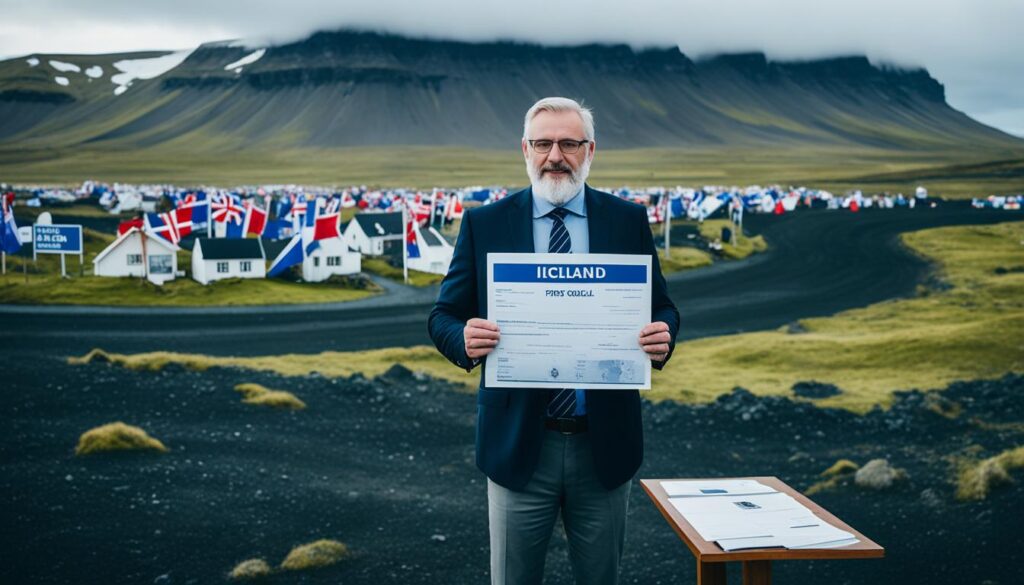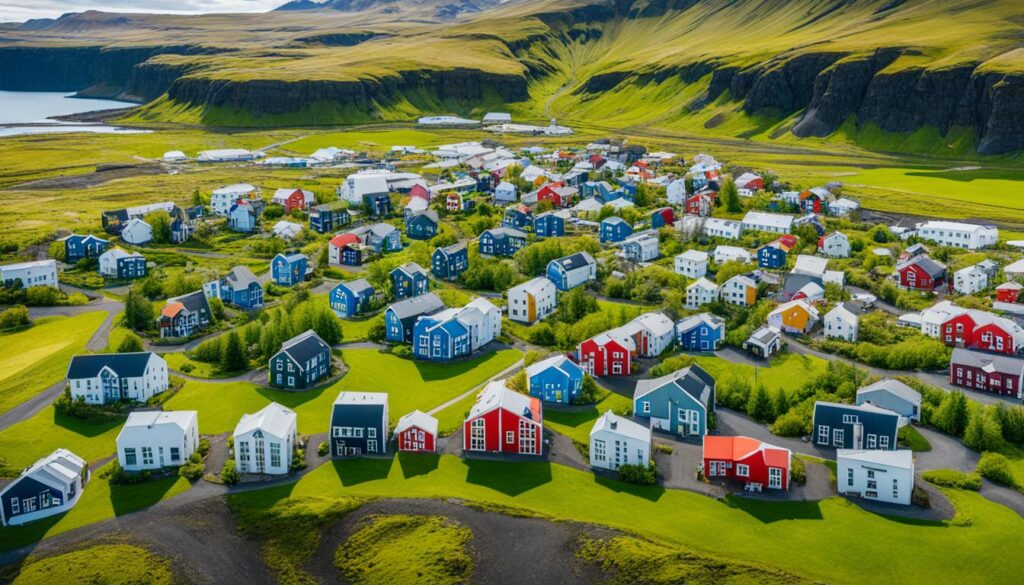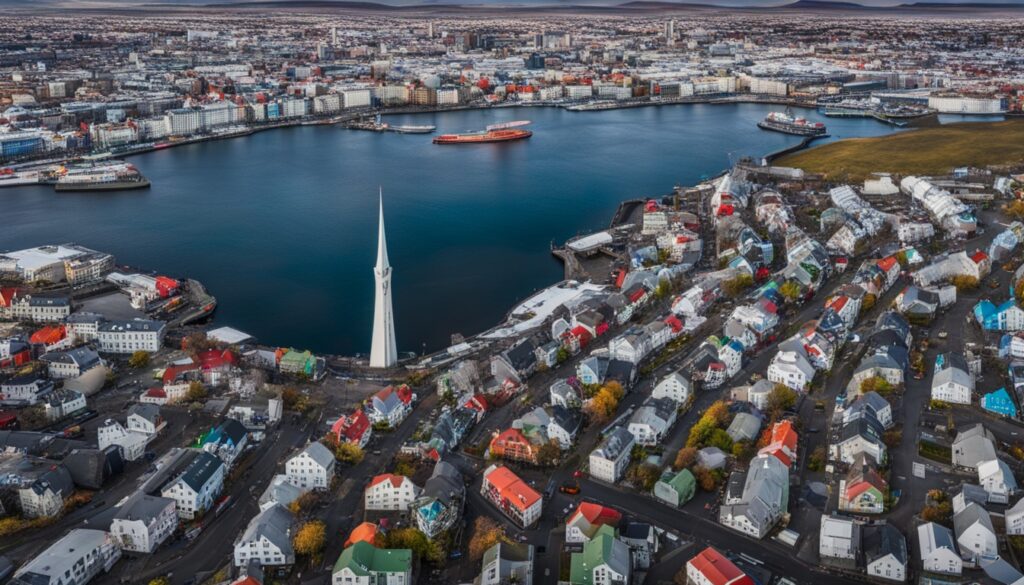Iceland has become a popular choice for foreign property buyers due to its stunning landscapes and high quality of life. Many are interested in the question, “Can Foreigners Buy Property In Iceland?” As you explore the possibilities of buying property in Iceland as a foreigner, it is essential to understand the rules, processes, and benefits associated with foreigners owning property in Iceland. The beautiful island nation offers a variety of options, from vibrant urban living in Reykjavik to the serene landscapes of rural areas. For detailed guidelines on buying property, check out this comprehensive guide
Key Takeaways
- Iceland allows foreign nationals to buy property, subject to reciprocity rules.
- Reykjavik has some of the highest property prices, with ranges from ISK 800,000 to ISK 1,500,000 per square meter.
- Legal and registration fees can add to the overall cost of property transactions.
- The majority of foreign property buyers come from the United States and the UK.
- Approval from the Ministry of Justice is required for foreigners seeking to purchase property.
Contact us if you are Interested in Buying Property Abroad!
Introduction to Real Estate in Iceland
Iceland’s real estate market has experienced significant resilience and growth, attracting both domestic and international interest. With an average home cost of around $250,000, purchasing property in Iceland can be considerably more affordable than in other European countries such as the United Kingdom or Germany1. Factors like the breathtaking scenery, low crime rates, and high-quality health and education systems make the property market in Iceland particularly appealing to foreign buyers in Iceland real estate.
Many foreigners consider investing in Icelandic property not just for personal use but as a means to secure long-term stays or residency. Annual returns for real estate investments typically reach up to 10%, which outpaces alternative investment avenues like stocks and bonds1. Additionally, buyers can capitalize on tax advantages, such as the absence of capital gains tax if the property is maintained for at least two years and no inheritance tax1.
Real estate transactions generally incur a total cost of about 2% of the purchase price, while selling a property costs between 1% and 2% of the sale price1. This cost structure, combined with favorable growth conditions marked by a GDP growth average of 3.4% from 2009 to 2019, underscores the potential profitability in Iceland’s property sector1.
As the market continues to evolve, foreign buyers can find diverse real estate opportunities and a welcoming environment to invest in Iceland real estate.
Understanding Property Ownership in Iceland

Property ownership in Iceland is subject to strict regulations that distinguish between EEA and non-EEA nationals. Foreign property ownership rights in Iceland primarily allow EEA citizens to acquire property without additional permissions, promoting easier access for European residents.
As of 2018, foreign individuals held only 1.33% of total registered land in Iceland, which includes partial ownership, indicating a significant contrast with local ownership levels2. Foreign ownership is notably lower, particularly when compared to other categories of ownership in the country2.
In July 2020, the Icelandic government implemented a law limiting individual land ownership to a maximum of 10,000 hectares, unless special permission is granted by the Minister of Agriculture. This showcases the government’s commitment to maintaining control over land ownership in Iceland2.
To elaborate further, foreigners interested in purchasing Icelandic real estate often consist of various nationalities, with around 27% from the United States and 16% from the United Kingdom3. The necessity for special permission from the Minister of Justice for those not meeting citizenship or residency requirements complicates the buying process for non-EEA nationals2.
Understanding these nuances in foreign property ownership rights in Iceland is essential for potential buyers navigating the local legal landscape efficiently. It is important to remain informed about these regulations to avoid any potential issues during the purchasing process.
Can Foreigners Buy Property In Iceland

Foreigners buying property in Iceland can navigate a complex landscape of regulations and guidelines. It is essential for potential buyers to understand the differences based on their nationality. This clarity helps streamline the real estate acquisition process and enhances overall confidence in making an investment.
General Guidelines for Foreign Buyers
For real estate ownership in Iceland for foreigners, EEA residents have the privilege of purchasing property on par with Icelanders. They do not require prior approval, making the process more straightforward. Conversely, non-EEA nationals must seek approval from the Ministry of Justice, requiring them to demonstrate intent to reside or establish a business in Iceland.
Differences Between EEA and Non-EEA Nationals
The distinction between EEA and non-EEA buyers reflects the legal frameworks surrounding property transactions. Those from the EEA can proceed with fewer barriers, sustaining a broader interest among foreign investors. It is worth noting that the market has seen a surge in demand, especially from EEA residents eager to capitalize on the Icelandic real estate market.
As interest continues to grow, understanding these regulations is crucial for anyone involved in real estate ownership in Iceland for. A well-informed approach ensures that potential challenges are minimized and investment opportunities maximized. Such understanding supports the decision-making process and leads to a smoother transaction experience for all parties involved4.
The Benefits of Investing in Icelandic Real Estate

Investing in Icelandic real estate provides substantial advantages for both foreign and local buyers. One of the key factors drawing investors is the stunning natural scenery and the quality of life in Iceland, which is characterized by safety and a strong sense of community. As the country increasingly attracts tourists—particularly from the United States, UK, and Germany—the demand for residential properties has surged, especially in Reykjavik, which boasts a dynamic cultural scene and nightlife4.
Scenic Beauty and Quality of Life
The breathtaking landscapes of Iceland offer a tranquil environment that enhances overall living experiences. The low crime rates and high standard of living make it particularly appealing for families and retirees. The country stands out due to its lack of annual property tax, allowing investors to enjoy their properties without the burden of exorbitant fees5. This contributes to the numerous benefits of Icelandic real estate investment, allowing buyers to relish in their acquisitions without ongoing costs.
Rental Market Opportunities
Iceland’s thriving tourism sector fuels a lucrative rental market, especially in urban centers like Reykjavik. The impressive growth in tourist numbers, surpassing 2.3 million in 2018, highlights the continual influx of visitors seeking short-term accommodations6. The government actively supports foreign investments through programs like “buy a property, get a residence permit,” which incentivizes ownership while addressing housing demands5. These factors underline the significant rental market opportunities available for property owners in Iceland, marking it as a wise investment destination.
The Legal Framework for Foreign Property Buyers

The legal requirements for foreign property buyers in Iceland are essential for ensuring smooth transactions and compliance with local laws. Foreigners interested in purchasing property must seek approval from the Ministry of Justice.
Approval from the Ministry of Justice
For non-EEA nationals, it is crucial to obtain this approval as part of the legal requirements for foreign property buyers in Iceland. The process may involve submitting relevant documentation and, in some cases, demonstrating the financial capability to sustain ownership.
Resident Permits and Their Importance
A resident permit is necessary for foreign buyers who wish to stay longer than three months in Iceland. This requirement is particularly relevant for those planning to live in their purchased property, ensuring compliance with the country’s immigration policies. By understanding these legal parameters, foreign buyers can navigate the process more effectively.
| Aspect | Details |
|---|---|
| Approval Authority | Ministry of Justice |
| Approval Requirement for Non-EEA Nationals | Mandatory |
| Resident Permit Necessity | Required for stays over three months |
| Documentation Needed | Various, including financial proof |
Understanding the legal framework will empower potential buyers to make informed decisions as they engage with the Icelandic real estate market. Compliance with these legal requirements for foreign property buyers in Iceland sets the foundation for successful property ownership7.
Finding the Right Property in Iceland

Searching for your ideal property in Iceland can be greatly simplified by utilizing various tools and professional services. A wealth of property listings in Iceland is available through dedicated real estate portals, offering everything from residential homes to investment opportunities. Pairing these online resources with the expertise of local real estate agents in Iceland can ensure a comprehensive search process.
Real Estate Portals and Listings
When exploring property listings in Iceland, several online platforms showcase the latest available properties. These portals provide detailed information, including photos, property features, and pricing, making it easier for potential buyers to narrow their choices. Some popular real estate websites in Iceland maintain updated listings, enhancing your ability to find what fits your needs best.
Working with Local Agents
Engaging with local real estate agents in Iceland offers numerous advantages. These professionals understand the nuances of the Icelandic market and can assist in navigating both the search and negotiation processes. Typically, estate agents in Iceland charge a commission of about 2-3% based on the final sale price of the property and may also have valuation fees depending on property complexity7. With their help, you can discover properties that align uniquely with your preferences and financial goals.
Contact us if you are Interested in Buying Property Abroad!
Price Trends in the Icelandic Real Estate Market

The Icelandic real estate market experiences considerable fluctuations influenced by various factors. Understanding these Iceland real estate price trends is essential for potential buyers, particularly those focusing on the capital, Reykjavik, compared to rural regions. In Reykjavik, residential property prices typically range between 40 million ISK and 50 million ISK, which translates to approximately US$ 382,500 to US$ 478,1303. In contrast, areas like the Westfjords offer some of the lowest regional property prices in Iceland due to their sparse population and remote location3.
Average Property Prices by Region
When assessing regional property prices in Iceland, buyers should note significant discrepancies. For example, while homes in Egilsstadir, a city in East Iceland, fetch higher prices due to local amenities such as an airport and hospital, areas outside of populated towns represent a more affordable option. The Ministry of Infrastructure’s Housing Greenbook highlights a growing concern regarding residential properties, indicating plans to address housing shortages8.
Factors Influencing Property Prices
Numerous factors can impact real estate prices in Iceland, including location, amenities, and market demand. Economic indicators, like inflation rates which peaked at 10.2% in 2023, contribute to high interest rates affecting buyers’ purchasing power8. Notably, transaction costs from real estate agents amount to 1.5% to 2.4% of the property value, adding to the financial considerations for foreign investors3.
The Property Buying Process in Iceland
Understanding the property buying process in Iceland is essential for both locals and foreigners eager to invest in this unique market. The journey typically begins with identifying the desired property and evaluating crucial aspects such as location, price, and potential return on investment. Foreign buyers should familiarize themselves with necessary steps to ensure a smooth transaction.
Steps to Complete the Purchase
The property buying process in Iceland involves several important steps:
- Identify Property: Conduct thorough research to find properties that meet your criteria, taking note of the central Reykjavik prices ranging from ISK 800,000 to ISK 1,500,000 per square meter9.
- Get Financial Approval: Secure necessary financing to move forward with your purchase.
- Make an Offer: Approach the seller with a formal offer, which can often be negotiated.
- Sign Purchase Agreement: Once both parties agree on terms, a purchase agreement is signed. A handshake can hold as much weight as the signed contract in Iceland’s culture.
- Transfer Ownership: Complete the registration process at the local Magistrate’s Office, which costs 0.4% of the property’s valuation plus ISK 1,35010.
Documentation Required for Foreign Buyers
Gathering the right buying real estate documentation for foreigners is crucial to expedite the purchasing process. Key documents include:
- Valid proof of identity (passport or national ID)
- Evidence of financial capability or mortgage approval
- Tax identification number for transactions
- Any relevant legal documents concerning the property
Additionally, hiring a reputable lawyer is advisable, with legal fees typically ranging from ISK 100,000 to ISK 300,000 or more9. Completing all steps correctly will lead to a successful experience in the Icelandic property market.
Costs Involved in Purchasing Real Estate
Understanding the costs involved in buying property in Iceland is crucial for foreign buyers. These costs include various fees and taxes associated with the purchase process, as well as additional expenses that can arise unexpectedly.
Transaction Fees and Taxes
The fees and taxes for foreign buyers in Iceland typically encompass several elements. Legal fees for purchasing property usually range from ISK 100,000 to ISK 300,000 or more, depending on the transaction’s complexity and location9. Buyers should also consider standard mortgage fees, which may include registration fees, mortgage issuance fees, credit evaluation fees, and lien check fees. Furthermore, property prices in central Reykjavik can be significantly high, ranging from ISK 800,000 to ISK 1,500,000 per square meter9. An additional factor to keep in mind is the increasing trend toward short-term rentals, influenced by tourism, which can affect property values and associated costs.
Other Hidden Costs to Consider
Beyond the evident costs, potential buyers should remain vigilant about hidden expenses that can surface during the purchasing process. For instance, owning property in Iceland may incur maintenance fees or property management costs, which can vary greatly depending on the property’s location and type. It’s critical to factor in these ongoing costs when determining the overall costs of buying property in Iceland. Additionally, being aware of local market conditions can inform decisions about arriving at competitive purchase offers and understanding future investment values. A thorough analysis of the overall financial commitment will provide clarity and insight for prospective buyers keen on exploring the Icelandic property market.
For more detailed information on the property market in Iceland, check this link.
Building Your Own Property in Iceland
For those interested in building property in Iceland, familiarity with local regulations and requirements is vital. Building projects in Iceland are subject to various legal frameworks, particularly concerning land use and construction permits. Navigating the real estate construction regulations in Iceland can be a complex task, but understanding the necessary permits and restrictions can enhance the construction experience.
Obtaining Necessary Permits
Before starting any construction, obtaining the required permits is essential. The requirements can vary depending on the project size and location. For instance, projects near national parks or protected areas often require additional documentation and approvals to ensure environmental protection. Each municipality in Iceland may have its own set of rules, thus researching local guidelines is crucial.
Location Restrictions for Building
Apart from permits, location restrictions must be taken into account when planning to build property in Iceland. Specific areas may have zoning laws that limit types of structures or dictate architectural styles. It is important to engage with local authorities early in the process to avoid future complications. Considerations such as proximity to natural landscapes, historical sites, or essential amenities can influence building possibilities significantly.
| Parameter | Details |
|---|---|
| Required Permits | Building permit, environmental assessment, zoning approvals |
| Location Factors | Proximity to national parks, environmental sensitivity, community planning |
| Zoning Restrictions | Residential, commercial, mixed-use zones |
| Environmental Considerations | Impact assessments for protected areas |
Challenges Facing Foreign Buyers
Foreign property buyers in Iceland often encounter various challenges that can complicate their purchasing journey. Understanding the cultural considerations in Iceland real estate is vital for navigating these hurdles effectively. Familiarizing oneself with local customs and language can enhance communication with agents and sellers, bridging potential gaps in understanding.
Navigating Cultural Differences
The challenges for foreign property buyers in Iceland largely stem from cultural differences. Icelandic culture values direct communication and transparency, which may differ significantly from what buyers are accustomed to in their home countries. Awareness of these nuances can help foreign buyers engage more effectively and foster trust with local stakeholders.
Understanding the Local Market
Another significant challenge lies in grasping the dynamics of the local real estate market. Iceland’s unique property landscape is influenced by factors such as limited supply and high demand. A thorough understanding of these elements, including market trends and pricing, is essential for making informed buying decisions. Engaging with local experts specializing in residential and commercial properties will further assist foreign buyers in overcoming these market complexities.
Building Your Property in Iceland Real Estate
Constructing a property in Iceland involves navigating through many legalities and adhering to specific standards associated with property construction in Iceland. Local real estate building regulations in Iceland ensure compliance with safety, environmental, and zoning requirements. An understanding of these regulations is crucial for any foreigner keen on building in Iceland.
Foreign interest in Icelandic real estate is increasing, emanating from various countries, including around 27% from the United States and 16% from the United Kingdom3. This interest extends to property construction, where the demand for housing has surged. In 2016, the residential property price index was 8.06%, jumping to 23.15% in 2017, revealing a robust real estate market that bolsters the appeal for constructing property here3.
The legal framework for property construction includes obtaining necessary permits. For example, the reciprocity principle allows nationals from certain countries the opportunity to construct properties if their home countries permit the same for Icelanders9. Hence, potential builders must first ensure compliance with these mutual agreements.
To dive deeper into property prices, average prices in central Reykjavik range from ISK 800,000 to ISK 1,500,000 per square meter, reflecting the high demand for real estate in urban areas9. Moreover, engaging with local architects and builders familiar with the real estate building regulations in Iceland can significantly ease the construction process and help navigate the unique challenges of the Icelandic landscape.
Budgeting for a project must factor in not only land costs but also additional fees like legal expenses, which typically range from ISK 100,000 to ISK 300,000 and property transfer taxes, which can influence overall affordability9. As the landscape shifts towards more eco-friendly homes and rural properties due to changing work dynamics, foreign investors looking to build or develop must stay informed about evolving trends and regulations in Iceland.
| Aspect | Details |
|---|---|
| Average Property Prices in Reykjavik | ISK 800,000 to ISK 1,500,000 per square meter |
| Legal Fees for Property Purchase | ISK 100,000 to ISK 300,000 or higher |
| Stamp Duty Fees | 2,000 ISK plus 0.8% of property value |
| Registration Fee | 0.1% of property value |
Conclusion
For foreigners curious about investing in Icelandic real estate, understanding the unique landscape of property ownership is essential. The summary of property ownership in Iceland for highlights a blend of opportunities and challenges. While Iceland has stringent regulations in sectors like fishing and real property, with notable cases such as the restriction on Chinese billionaire Huang Nubo’s land purchase in 2012, the market remains attractive for serious investors.
Foreign buyers, including notable figures like British billionaire Sir Jim Ratcliffe, are successfully acquiring prime parcels of land, often amid a competitive landscape where most transactions are dominated by Icelandic nationals. Real estate offers excellent potential for appreciation and rental yield, with specific properties requiring deposits that can range between 20% to 30% of the purchase price, depending on their value12. Working with local agents can further ease the process, helping investors navigate the complexities of the market.
With supportive policies and a relatively stable investment environment, those interested in investing in Icelandic real estate can thrive with the right guidance. By understanding local laws, complying with restrictions, and exploring various financing options, foreign investors can capitalize on the beauty and uniqueness of Iceland, making it a truly rewarding investment choice13.
Contact us if you are Interested in Buying Property Abroad!
FAQ
Can foreigners buy property in Iceland?
What are the differences in property ownership rights between EEA and non-EEA citizens?
What are the benefits of investing in real estate in Iceland?
What is the process for foreign buyers to purchase property in Iceland?
Are there any costs associated with purchasing property in Iceland?
What permits do I need to build my property in Iceland?
How can I find the right property in Iceland?
What should I know about the price trends in the Icelandic real estate market?
What challenges might foreign buyers face in Iceland?
Source Links
- https://www.450.is/post/should-i-invest-in-real-estate-in-iceland
- https://playiceland.is/who-owns-iceland-the-right-to-roam-in-iceland-explained/
- https://www.carsiceland.com/post/iceland-real-estate
- https://swappagency.com/2020/08/05/buy-property-in-iceland/
- https://www.linkedin.com/posts/fernando-aguirre-dhs_icelandrealestate-investiniceland-icelandproperty-activity-7107004604147531776-u-zN
- https://www.state.gov/reports/2021-investment-climate-statements/iceland/
- https://www.expatfocus.com/iceland/guide/iceland-finding-property-to-buy
- https://grapevine.is/mag/articles/2024/07/12/too-little-too-late-icelands-shambolic-housing-market/
- https://www.expatfocus.com/iceland/guide/iceland-buying-property
- https://www.expatfocus.com/iceland/articles/how-to-purchase-property-in-iceland-5584
- https://www.reykjavikcars.com/blog/icelandic-culture/iceland-real-estate-guide
- https://www.expatfocus.com/iceland/guide/iceland-property-financing
- https://finance-commerce.com/2018/08/iceland-wants-foreigners-to-stop-buying-its-land/

Comments